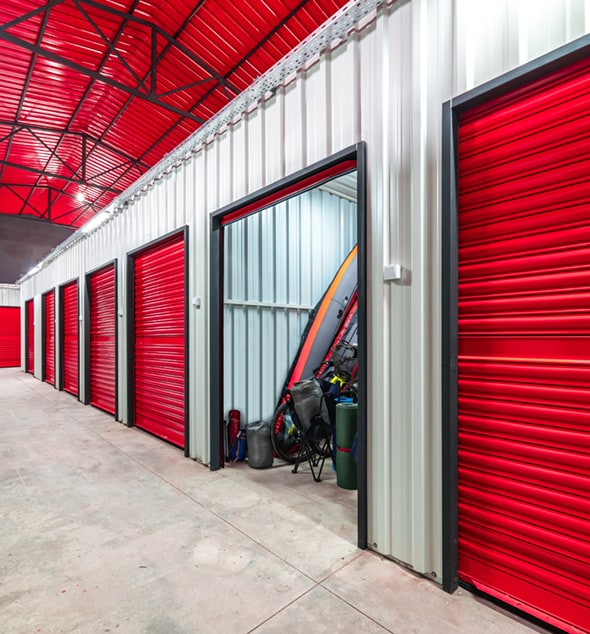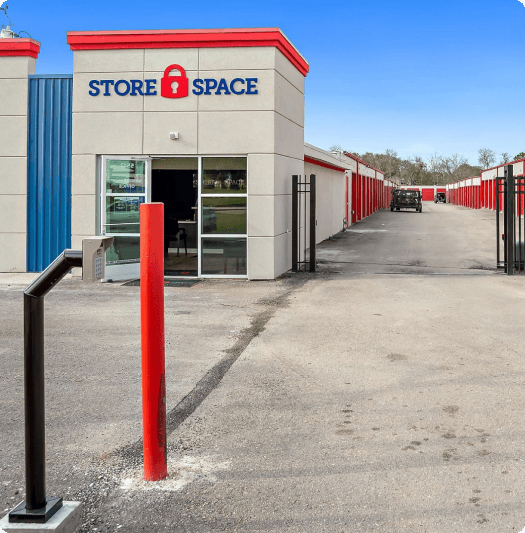How to Store a Motorcycle: 4 Awesome Reasons why Self Storage is a Must-Have

We get asked how to store a motorcycle on a fairly regular basis, which is why we invented motorcycle storage. OK, we didn’t “technically” invent motorcycle storage, but we’ve got a pretty compelling argument as to why you need it in your life.
Can you store a motorcycle in a storage unit? Yes, motorcycles can be stored in storage units. We recommend 5x10' units for most types of motorcycles.
Before we grip the handles and twist the throttle on how to store a motorcycle, let’s talk about some of the advantages a self-storage unit can offer motorcycle enthusiasts.
- Out of the Way — A storage facility offers a place to park your motorcycle that's out of the way and surrounded by thoughtful features, like a keypad-controlled gate, video cameras, access control and more.
- Protection — Weather can destroy plastics, leather and paint, making it imperative to keep your motorcycle inside as much as possible.
- Flexibility — Storage leases are typically month-to-month, meaning you can store on your terms when your bike is not being ridden.
- Affordability — Purchasing a garage condo or renting a man cave is an amazing way to store all your rides, but these can be prohibitively expensive. With move-in promotions and low, monthly rates, a self-storage facility is the affordable alternative.
The Joys of Owning a Motorcycle
Putting your knee down into a tight turn. Getting a little added protein when a bug flies into your mouth. Sitting back and cruising with like-minded compatriots. Feeling the acceleration as you twist the handle. Absorbing the compression when landing a jump. Hearing the leather crackle just so….
Riding a motorcycle comes with its own set of amazing sensations that you don’t get with most other types of vehicle.
For the uninitiated, the sight of something on two wheels is just a dangerous, reckless form of transportation.
But for the rest of us, straddling the saddle and strapping on the helmet is the epitome of freedom. Great gas mileage, amazing handling, lightning-quick acceleration, plus an unfiltered view of the world around you.
Freedom comes in more shapes, styles and sizes of motorcycles than there are drinks at Starbucks (OK, probably not, but you get the point).
Ideas on How to Store a Motorcycle
There are always going to be a number of reasons for needing motorcycle storage. Here are some of the most popular reasons our customers need Store Space.
Seasonal Storage – In many climates, it gets too cold to ride in the winter and too wet to ride in the spring, leaving just two seasons to enjoy your motorcycle. Self-storage units make a great way to bridge the gap between seasons.
Garage Substitute – Whether you’re in an apartment or your house lacks adequate garage space, a storage unit serves as a great way to keep your ride out of the way.
Military Deployment – We know that being a member of the military comes with its own set of challenges, so worrying about your motorcycle shouldn’t be one of them. We also offer 10% active military discounts as our way of saying thanks for your service!
Extended Trips – While some people are bold enough to ride their motorcycles on long tours, that takes a level of commitment that many are not ready to make. If you’re more about the destination than the journey, get a storage unit to ensure your bike is in good shape when you return.
Types of Motorcycle Storage
Whether you’ve got a touring motorcycle with full fairings and saddle bags that is more than 8 ft. long, or you’ve got a dirt bike with a short wheelbase and an overall length closer to 6 ft., most motorcycles can fit in a 5 ft. by 10 ft. storage unit. These are a standard storage unit size and can be found at most storage facilities with drive-up storage units.
If you have two or more motorcycles, you might be able to store two small scooters or dirt bikes in the same 5 ft. x 10 ft. unit, but since most handlebars are about 3 ft. wide, so you’ll probably want a 10 ft. by 10 ft. storage unit (or larger) to allow for a buffer between the two.
Special consideration needs to be made for three-wheelers. Some are as wide as (or wider than) an economy car, which is great for their handling characteristics, but not as great for fitting in a storage unit. A 10 ft. by 10 ft. storage unit should accommodate a single three-wheeler.
No matter what size unit you rent, remember to use your leftover space for helmets and gear storage or other sports equipment and seasonal gadgets, amenities, instruments and supplies.
Drive-up Storage Units — These are the most common types of storage units used for motorcycle storage. As the name suggests, drive-up units are ground-level with a roll-up steel door, making access fast and convenient.
Climate-controlled storage — Climate control is a feature found at some storage facilities that regulates temperature year-round, mitigating damage from temperature extremes and humidity.
Covered motorcycle parking — While these are harder to find, some storage facilities offer covered motorcycle parking. This is typically a common-space area, protected by a gated entrance.
Outdoor secure parking — Many storage facilities offer secure, outdoor parking spaces in a variety of sizes to accommodate everything from cars to the largest RVs. Motorcycles can be stored for a short time, but we recommend a weatherproof cover and wheel-locks. Outdoor storage can also be used for trailers for your motocross bikes, or your enclosed toy haulers, among other applications.
Of note: Check with your store manager to ensure that motorcycle storage is available at your nearest Store Space location. And always be sure to read your Rental Agreement
How to Winterize your Motorcycle
Consumers (that’s you) not only need to know how to store a motorcycle, but also how to prep their bike for winter or long-term storage.
Storage units are usually a better option than your garage, simply because they can remain sealed from the weather, protecting your motorcycle from moisture, rust and corrosion. Add to that the security of a storage facility and it’s a no-brainer.
Here are a few of the most common winterization tips to keep your motorcycle well-preserved during the off-season:
- Make any pending repairs
- Clean the motorcycle thoroughly, including the chain
- Wax it
- Change the oil, oil filter and air filter
- Adjust and lube the chain (as necessary)
- Remove the battery and store in a cool, dry place
- Inflate the tires and raise the bike if possible
- Cover the bike with a breathable cover (or weatherproof for outdoor parking)
- Top off fluids
- Cover the tailpipe
There are other considerations that might be brand-specific that can be found in your owner’s manual.
Pro tip: Contact your insurance agent whenever your riding habits change. Your motorcycle still needs to be licensed and insured, but you can likely reduce your coverage while your cycle is being stored.
FAQs
Q: How do you store a motorcycle long term?
A: Preparing a motorcycle for long-term storage is very similar to the winterization process we detailed above. Check your owner’s manual for specifics to your model. Make sure to include a self-storage unit in your list of must-haves!
Q: Is it OK to store a motorcycle outside?
A: Outdoor storage is not the best option, but can be achieved for short periods of time. Make sure you have an all-weather cover and security to keep the bike safe.
Q: How do you keep an unused motorcycle?
A: Drive-up self-storage units are among the most popular ways to keep a motorcycle in good shape if it’s not being ridden regularly. Garages can be susceptible to weather incursions and man-caves can be overly expensive to buy or lease. Regardless of the method you choose, make sure to follow reputable winterization steps before parking your bike for a long time.
Q: What happens when a motorcycle sits for years?
A: Besides becoming very lonely, a motorcycle can experience a number of different issues if you don’t take care to protect it from the elements. Plastic and leather can crack or warp, tires can go flat and crack, oil will attract dust and grime, and gasoline will thicken and choke the fuel lines. Following a strict winterization protocol (and using a storage unit) can help your bike stay in great shape until you’re ready to ride again.
Wrapping Up: How to Store a Motorcycle
So now that you know how to store a motorcycle, it's time to put that knowledge to use. Store Space offers motorcycle storage at many of our facilities. Visit our easy-to-use storage location finder to find the location nearest you.







